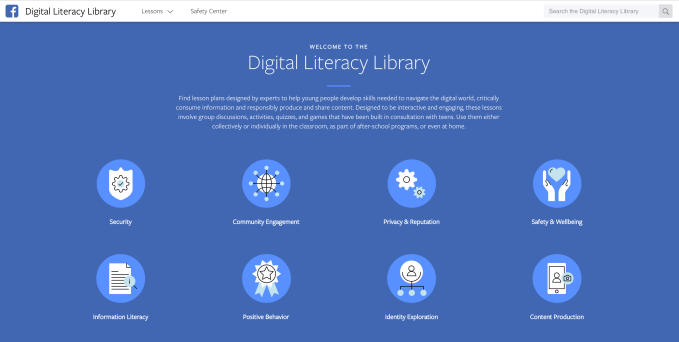
Facebook this morning announced the launch of a new set of educational resources focused on helping young people think critically and behave thoughtfully online. The Digital Literacy Library, as the new site is being called, is aimed at educators of children aged 11 to 18, and address topics like privacy, reputation, identity exploration, security, safety, wellbeing and more.
There are 830 million young people online, the company notes, which is why digital literacy is necessary. We’ve seen the results what can happen when people are lacking in digital literacy – they’re susceptible to believing hoaxes, propaganda and fake news is true; they risk their personal data by using insecure apps; they become addicted to social media and its feedback loop of likes; they bully and/or are bullied; and they don’t take steps to protect their online reputation which can have real-world consequences, to name a few things.
However, many teachers today lack the educational resources that would allow them to teach a digital literacy program in their classroom, or in other less formal environments.

Facebook says the lesson plans in the new library were drawn from the Youth and Media team at the Berkman Klein Center for Internet & Society at Harvard University, where they were released under a Creative Commons license. In other words, the company itself did not design the lessons, it’s only making them more broadly available by placing them on Facebook where they can be more easily discovered and used.
The lessons themselves are based on over 10 years of academic research from the Youth and Media team, who also took care to reflect the voices of young people from diverse socioeconomic backgrounds, ethnicities, geographies, and educational levels, Facebook says. Initially, the 18 lessons are launching in English, but they’ll be soon available in 45 additional languages.
For educators, the lessons are ready-to-use as free downloads, and state how long each lesson will take. Outside the classroom, parents could use them to teach children at home, or they could be used in after-school programs. Teachers can also modify the lessons’ content to meet their own needs, if they choose.
The courses will be made available in Facebook’s Safety Center and Berkman Klein’s Digital Literacy Resource Platform for the time being. Facebook says it’s also working with other non-profits worldwide to adapt the lessons and create new ones.
This isn’t the first time Facebook has offered educational resources aimed at young people.
The company also recently launched its Youth Portal, which provides educational material directly to teens, not their teachers. However, those resources are focused more on Facebook itself, providing guidance on things like how to navigate the service, how to stay secure, and how to understand how people’s data is used. (Arguably, this sort of information is something a large number of adults could use a refresher on, as well.)
In addition, Facebook has begun to roll out educational guidance into its new app, Messenger Kids, aimed at the under-13 crowd. The app encourages children to be kind and respectful online, by promoting empathy and positive messaging through things like the “Messenger Kids Pledge,” kindness stickers, and other in-app challenges.
At the root of all this is the fact that Facebook, along with most social media, has corrupted the way people interact and navigate the online world. And it is now belatedly is waking up to its role and its responsibilities on that front. These large platforms were built by optimistic engineers who for years only saw the positive side of connecting the online world, and not the potentially negative outcomes – like data theft and misuse, fake news, hacking, attempts to disrupt democracy, bullying, targeted harassment, and even genocide. A literacy program could help the next generation of users, but it has arrived too late for many of Facebook’s users.
Below, are the lesson plans’ description, for reference:

